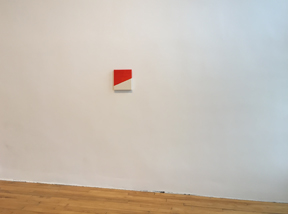Still it is what keeps me going and what interests me about the slow process of making quilts.
So for the New Year, I just had to see the new exhibit of Sarah Crowner at Mass MoCA called "Beetle in the Leaves" where she combines the techniques of sewing and piecing to create abstract paintings that reflect contemporary life. These are paired with assembled pieces of tile that are either floors that can be walked on or wall art to contemplate. Or at least that was what the blurbs said about her work.
I was sold on the concept. When I first walked into the space the scale was impressive. Three large rooms with large paintings and a large tile floor. Such interesting shapes in the paintings--for that is what they are called and I think that word matters. Don't you love the simple but complex spaces in this work.
 |
| sarah crowner--mass moca--2017 |
The tile floor also reflects the geometry and is meant to be walked on with just a few splashes yellow paint to add a hint of design to that space. For me, the floor was part of the whole but less effective by itself although reading the literature the shape does represent a geometric leaf that allows the tiling with a minimum number of joints. Although maybe this was part of the inspiration for the title of the show--just saying.
 |
| sarah crowner--mass moca--2017 |
The colors of blue in this design are painted for even more surface texture. Each one a slightly different shade to make it more complex and rich.
 |
| sarah crowner--mass moca--2017 |
What about the color and shape in this simple design. Such a universal but modern feeling with the thin lines stretching out like birds in flight or leaves on the trees.
 |
| sarah crowner--mass moca--2017 |
Upon closer examination I discovered that even the simple all white designs were composed of different canvas fabrics that had been manipulated and stitched together. But why was it framed in this orange that reminded me of orange from the sixties?
 |
| sarah crowner--mass moca---2017 |
Looking carefully you can see the shapes that evolve. Interestingly she used a dark blue thread for the stitching itself that barely peeks through the seams. Can you see it?
 |
| sarah crowner--mass moca--2017 |
In another room was a large tile hanging designed specifically for this space. The hanging was about 10 feet high by 20 feet wide with a bench one could sit on to contemplate it.
 |
| sarah crowner--mass moca--2017 |
This picture does not do it justice since each tile was rich in color and design. Looking at it my eye kept choosing first one and then another tile that became my favorite.
 |
| sarah crowner--mass moca--2017 |
Noticing the industrial walls of Mass MoCA it was clear that it had been designed to complement this space and the soft teal that was barely visible on the paint.
 |
| sarah crowner--mass moca--2017 |
The windows added an additional layer of geometry reflected in this tile. It should be noted that the colors seemed brighter than my camera allowed as you will see if you make it to this exhibit.
 |
| sarah crowner--mass moca--2017 |
But then there was the mystery. For on the other wall was one small square painting in orange. What was it doing there? The scale seemed wrong to the point of being absurd and contradictory. However, it had to be intentional for this was a very well-planned exhibit so what was I missing? What a puzzlement?
 |
| sarah crowner--mass moca 2017 |
Until I took one final glance back as I left the space and started to walk down the stairs. First I saw how the hints of orange in the two paintings tied in with the orange frames in the next room.
 |
| sarah crowner--mass moca--2017 |
 |
| sarah crowner--mass moca--2017 |
And though it was time to head home, the exhibition seemed complete and challenging giving me much to think about. What a great day at the museum. The show at Mass MoCA runs through February 12. There is lots more to see at the Museum which is open most days. For more info check out their web site www.massmoca.org
What shows have you seen recently? What has inspired you?
No comments:
Post a Comment